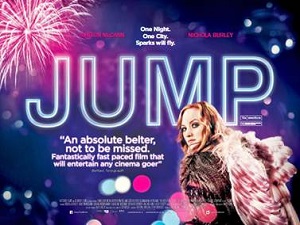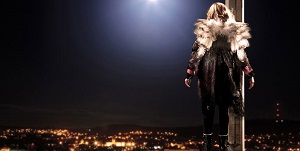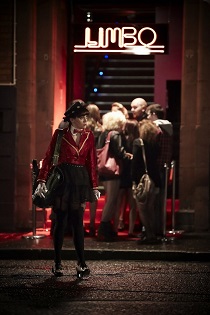 Also: Check out my video interview with Jump director Kieron J. Walsh.
Also: Check out my video interview with Jump director Kieron J. Walsh.
It is difficult to bring an audience along on the journey of a depressed individual, for that emotion invariably leaks into the viewers and makes the experience something of a slog. Truly, being depressed is lame, and going along for a ride with a melancholy individual is about as appealing as the prospect of downing a manure milkshake: a reality Kieron J. Walsh’s newest picture, Jump, bears out. And while there are flashes of brilliance tucked away in the corners of this film, each is suffocated by the flick’s seeming disregard for character and plot development.
Opening with a rapid-fire Irvine Welsh/Trainspotting-esque voiceover, the movie introduces itself via the dejected rambling of what quickly reveals itself to be a suicide benediction. Anchored thus in the world of its downtrodden narrator, Jump often tries to leap out of its own skin by shaking up its tonal structure, asking the audience to alternately view it as a gritty crime drama, wistful romantic love story, and wacky comedy of errors from one minute to the next. Any combination of two might have worked (and sometimes do), yet the sudden shifts between all three slam hard up against each other in Jump, and give the film a very schizophrenic identity.
The movie doesn’t help itself much by offering only the most basic core components of each character to its audience, as every one of them seems to serve a sketch-composite purpose, and little more. There’s the suicidal narrator, Greta (Nicola Burley), her loyal BFF, Marie (Charlene McKenna), and their mutual friend and town whore, Dara (Valene Kane), and so on, and so on. The plot unfolds when Greta meets Pearse (Martin McCann) on the same night that her father, the local Irish crime boss, is robbed. This theft sets off a series of events that intertwines the fates of all of the aforementioned characters, and scrambles up the expected fate of each with the others.
 In truth, it all sounds a lot more complex than it actually is. At a sparse 74 minutes (the credits might pad it out to 80 or so), Jump doesn’t seem interested in definition or purpose for its leads. Greta’s suffocating misery seems to come from boredom about life in general, yet when pressed, she confesses she’s simply mad at her crime boss father. Already a fairly standard and cheap plot device, this character point makes even less sense considering the one scene the audience does get to see with Greta and her pop: an interaction that appears entirely pleasant and loving.
In truth, it all sounds a lot more complex than it actually is. At a sparse 74 minutes (the credits might pad it out to 80 or so), Jump doesn’t seem interested in definition or purpose for its leads. Greta’s suffocating misery seems to come from boredom about life in general, yet when pressed, she confesses she’s simply mad at her crime boss father. Already a fairly standard and cheap plot device, this character point makes even less sense considering the one scene the audience does get to see with Greta and her pop: an interaction that appears entirely pleasant and loving.
Later, there’s talk of Marie wanting to get away with Greta, to leave Ireland and travel to a far-off place, yet aside from the fact that she works at a shitty convenience store, there’s no reason to indicate why Marie yearns to get away so desperately. As a result, Jump is forced to manage a lot of unfocused energy, something it tries to bundle up and redirect into a freewheeling plot whose many moving parts never seem to click into place. Director Kieron J. Walsh endeavors to keep all the plates spinning by giving the picture a non-linear structure, yet this device doesn’t help Jump in any real way, and only reveals more chinks in the armor of an already paper-thin plot. Although the audience might want to go along for the ride, the characters the movie does focus on are so unsympathetic or unappealing that it is hard to care what happens to them (even if one could swallow a plot turn that has two strangers falling madly in love in under two hours).
 What’s worse, the interesting people in Jump are so criminally underdeveloped that any victory or validation they might experience falls with a thud. In light of this, special credit should be given to Richard Dormer, who plays the disillusioned thug, Johnny, in Jump. Fans of the HBO drama Game of Thrones might recognize him as Beric Dondarrion (the eye patch dude with the flaming sword), and he’s no less imposing, mysterious, or intimidating here. Yet like everyone else in Jump, the audience knows practically nothing about him, and the little that’s revealed only furthers the immediate events shown on-screen. Had Kieron J. Walsh expanded on this universe a bit, and gone a little further off-book from the play upon which this film is based, the movie might carry a bit more weight than it currently does.
What’s worse, the interesting people in Jump are so criminally underdeveloped that any victory or validation they might experience falls with a thud. In light of this, special credit should be given to Richard Dormer, who plays the disillusioned thug, Johnny, in Jump. Fans of the HBO drama Game of Thrones might recognize him as Beric Dondarrion (the eye patch dude with the flaming sword), and he’s no less imposing, mysterious, or intimidating here. Yet like everyone else in Jump, the audience knows practically nothing about him, and the little that’s revealed only furthers the immediate events shown on-screen. Had Kieron J. Walsh expanded on this universe a bit, and gone a little further off-book from the play upon which this film is based, the movie might carry a bit more weight than it currently does.
Still, Walsh should be credited with making an entirely watchable film about Ireland that has nothing at all to do with The Troubles or the I.R.A., something of a victory in itself. Additionally, the shots the director captures in this nocturnal drama are often stunning, and punch up a number of scenes that yearn for a bit more depth. Sure, Jump has problems, yet one gets the sense watching it that these are primarily a result of a dearth of inspiration on the page, and not behind the camera.
A feature at this year’s Seattle International Film Festival, Jump isn’t going to piss anybody off, and it certainly looks good on the big screen, yet the nagging promise of what might have been sours a finished project that feels like a shadow of something much more substantial. Pity.





Comments on this entry are closed.